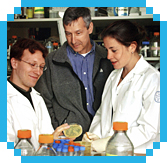To fully appreciate how genes work, you need to know something about epigenetics—the study of chemical modifications that can dramatically alter the activity of a gene without making any change in its DNA. In recent years, scientists have identified an array of epigenetic phenomena that are integral to biological function and may play a role in health conditions ranging from cancer to heart disease to autism.
One of the international leaders in the field of epigenetics is David Allis, a distinguished biochemist on the Rockefeller faculty who will present this year’s Talking Science lecture. A member of the National Academy of Sciences and a recipient of the Wiley Prize in the Biomedical Sciences, Dr. Allis is noted for essential discoveries about DNA-bound proteins in the chromosomes that play a key role in the epigenetic regulation of genes.
Recent research has demonstrated that epigenetic changes can occur in rapid response to shifting environmental and lifestyle factors, such as diet, exercise, or stress. Studies have also shown that—contrary to all expectations—epigenetic modifications can be passed from one generation to the next. The child of a cigarette smoker, for example, could inherit epigenetic marks that reflect the parent’s level of exposure to tobacco. These sorts of epigenetic adaptations are lightning fast when compared to the glacial pace of classic evolutionary change.
Studies have also shown that—contrary to all expectations—epigenetic modifications can be passed from one generation to the next. The child of a cigarette smoker, for example, could inherit epigenetic marks that reflect the parent’s level of exposure to tobacco. These sorts of epigenetic adaptations are lightning fast when compared to the glacial pace of classic evolutionary change.
The surprising revelations about environment’s impact on heredity are only part of the story. Research in epigenetics is also a great source of hope in biomedicine, holding significance for the understanding and treatment of many diseases. Discoveries David Allis made several years ago have already led to therapies for forms of leukemia that affect young people. Today, several biotech companies are developing experimental drugs that exploit epigenetic pathways. Many of these efforts focus on neurodegenerative diseases and infections, in addition to cancer.